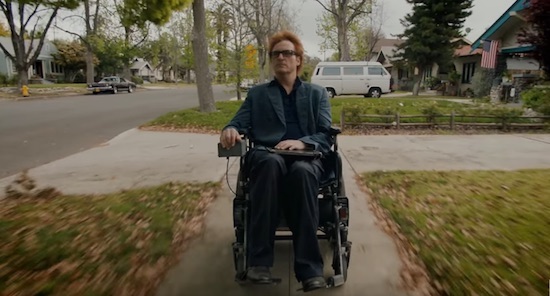When tragedy strikes, people often tell you to just try and find a silver lining. But what do you do when, one by one, each disaster feels like it’s eclipsed every last bit of light? John Callahan was a celebrated cartoonist for over twenty years. He was also abandoned by his mother as a small child, he battled alcoholism for years, and became a quadriplegic when he was twenty-one.
In Don’t Worry, He Won’t Get Far On Foot, Joaquin Phoenix takes on the role of Callahan, from the days leading up to his accident to much later in life on his journey to emotional recovery. When director Gus Van Sant was initially approached to adapt Callahan’s story, as written in his autobiography that gave the film its title, it was the late Robin Williams urging him to take on the project. You can’t help but imagine what magic the beloved actor would have brought to the role himself.
But Phoenix is wildly entertaining, a hurricane of sardonic humour that never falters. From Callahan’s early reckless swagger, with his tangerine-coloured hair and high-waisted flares, to the wiser front of an older, redemption-seeking artist, he plays his subject with an intense respect that feels like a brother honouring his family. He’s seriously credible, but knowingly mocking when he needs to be.
Van Sant directs Don’t Worry with audacity and nostalgia, and flirts with the boundaries of biting humour and old-fashioned aesthetics. Unafraid zooming shots nose into Callahan’s failures, observing each new step with a curious proximity. Sporadic montage sequences are edited together like a Powerpoint presentation, for no apparent reason other than to inject playfulness into what could have been an overwhelmingly torturous drama. The camerawork is candid and surrealistic, as it swoops and falls with little warning. There are hints of inspiration from Michel Gondry’s early documentary work following Noam Chomsky in Is The Man Who Is Tall Happy – especially when considering the skill with which Callahan’s cartoons are sewn into this story.
Beyond its charismatic protagonist, Don’t Worry boasts a powerful ensemble cast. Cartoonish, but powerfully developed characters join Phoenix as Callahan’s friends, love interests and inspirations. In his brief appearance, Jack Black successfully cements the tragicomic foundations of the film, returning with a brave sadness which proves indicative of a lifetime of trying without ever finding what you think is happiness. Rooney Mara as Annu and Jonah Hill as Donnie, on either side of Phoenix’s Callahan, are transformed, some kind of magical.
When Annu walks in to the hospital to meet John after his accident, there is no introduction, no contextual set-up to ground her in reality. Soft-spoken and glowing, Mara speaks with romantic optimism, representing a desperately needed beacon of something pure, something hopeful. She seems almost too good to be true, a spectral guest who’s just kind enough to stick around for a while.
A simultaneously opposing and guiding force, Jonah Hill is unrecognizable and hypnotic as Callahan’s AA guru and friend, Donnie. Leading the cultish Alcoholics Anonymous meetings with methodical plans and questionable affection (“my little piglets”, he coos to all those who attend), Donnie is an elusive presence – a possible hallucination, a real epitomisation of a flame that burned stronger rather than longer in his life. Is it too early to predict a buzz around Hill’s performance come awards season? It doesn’t feel like it, as his performance testifies to a real accomplishment of an honest, devouring role that some actors never fully rise to.
That’s not to say that Don’t Worry isn’t without its flaws – with larger-than-life characters that are further enhanced by creative direction, the film can suffer from overwrought and fumbled sentimentality at times. As well as dealing with his handicaps, both physical and mental, John comes to terms with his abandonment as a child. Indulging the running theme of religion and transcendent belief in a higher power, he has conversations with a picture of his mother on the wall. “I’m a cripple”, he finally tells her. As she appears and comforts him in a holographical holy form, it’s in these moments that Callahan’s memories of the truth seem to blur and the focus becomes a bit messier.
But then, it’s easy to ignore these moments and enjoy if you consider Van Sant’s film as an ode to an artist, bored of the unlucky and static hand he’d been dealt, who reshuffled the pack himself. Dark moments of pain are followed by carefree frivolity, the stillness of recovery is brought to life by the brilliant cartoons. If things seem extravagant and too good to be true – they probably are, but they are shown as Callahan wrote them himself.
“Maybe life’s not supposed to be as meaningful as we think it is”, Donnie suggests to John, in one of their final and most emotional conversations together. And maybe he’s right about biopics too – perhaps the pressure placed on retelling the truth doesn’t have to be so great and so morose. It’s a rare feat achieved by Don’t Worry, He Won’t Get Far On Foot, in consolidating the real account of a man plagued by misfortune with the dark humour that was so integral to his work. Where biopics have previously stumbled, by choosing to pursue either dry facts or sentimentalized fiction, Callahan’s story on screen is sometimes wise, sometimes silly; as richly conflicted as you’d hope his own life was. There’s no one resounding message or lesson to be learnt. Sometimes a silver lining is visible in its intense and glittering light – but most of the time, just learning to dodge the clouds is good enough.
Don’t Worry He Won’t Get Far On Foot will be released in July


